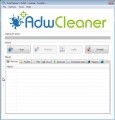Have you tried to open a well-known page and found that your web browser is redirected to a previously unseen web site called Your Browsing History Might Be Public that offers to install a suspicious browser extension? If you answered ‘Yes’ then your need to know that your system is affected with an ‘ad-supported’ software (also known as adware). The ‘ad supported’ software is a type of malicious software that changes your system’s browser settings so that you’ll be randomly re-directed to an intrusive ads. Use the guidance below as quickly as possible It will clean your system from the ad-supported software and thereby get rid of unwanted “Your Browsing History Might Be Public” popups. Moreover, the step by step instructions will help you to protect your computer from more harmful viruses and trojans.
The ad-supported software that causes multiple intrusive pop ups, can attack your personal computer’s browsers such as the Mozilla Firefox, Chrome, Microsoft Internet Explorer and Microsoft Edge. Maybe you approve the idea that the popup ads from it is just a small problem. But these intrusive “Your Browsing History Might Be Public” ads eat personal computer resources. Even worse, it can collect your browsing history and privacy data, including passwords and credit card numbers. In the future, personal data can be sold to third parties.
The ad-supported software usually hijacks only the Google Chrome, IE, FF and Edge by modifying the web browser’s settings or installing a harmful plugins. Moreover, possible situations, when any other web browsers will be affected too. The ‘ad supported’ software will perform a scan of the machine for web browser shortcuts and modify them without your permission. When it infects the web browser shortcuts, it’ll add the argument like ‘http://site.address’ into Target property. So, each time you open the internet browser, you’ll see an intrusive “Your Browsing History Might Be Public” web page.
Instructions which is shown below, will allow you to clean your system from the adware as well as get rid of “Your Browsing History Might Be Public” intrusive pop-up advertisements from the Chrome, Firefox, Microsoft Internet Explorer and MS Edge and other web-browsers.
Remove “Your Browsing History Might Be Public” pop up ads (removal tutorial)
There present several free ad-supported software removal tools. Also it is possible to delete “Your Browsing History Might Be Public” redirect manually. But we recommend to combine all these methods below into the one removal algorithm. Follow the steps of the guide. Read it once, after doing so, please print this page as you may need to exit your web-browser or restart your personal computer.
To remove “Your Browsing History Might Be Public” pop-ups, use the steps below:
- How to manually remove “Your Browsing History Might Be Public”
- Uninstalling the “Your Browsing History Might Be Public”, check the list of installed software first
- Remove “Your Browsing History Might Be Public” pop ups from Chrome
- Remove “Your Browsing History Might Be Public” from Firefox by resetting browser settings
- Remove “Your Browsing History Might Be Public” pop-ups from IE
- Fix infected web browsers shortcuts to delete “Your Browsing History Might Be Public” redirect
- Get rid of unwanted Scheduled Tasks
- Use free malware removal tools to completely delete “Your Browsing History Might Be Public” pop up advertisements
- How to block “Your Browsing History Might Be Public” redirect
- How to prevent “Your Browsing History Might Be Public” pop-up advertisements from getting inside your computer
- Finish words
How to manually remove “Your Browsing History Might Be Public”
The guide will help you get rid of “Your Browsing History Might Be Public” advertisements. These “Your Browsing History Might Be Public” removal steps work for the FF, Google Chrome, Microsoft Internet Explorer and MS Edge, as well as every version of Windows operating system.
Uninstalling the “Your Browsing History Might Be Public”, check the list of installed software first
First, you should try to identify and delete the program that causes the appearance of annoying advertisements or web-browser redirect, using the ‘Uninstall a program’ which is located in the ‘Control panel’.
Windows 10, 8.1, 8
Click the Windows logo, and then click Search ![]() . Type ‘Control panel’and press Enter as displayed in the following example.
. Type ‘Control panel’and press Enter as displayed in the following example.

Once the ‘Control Panel’ opens, press the ‘Uninstall a program’ link under Programs category as shown on the screen below.
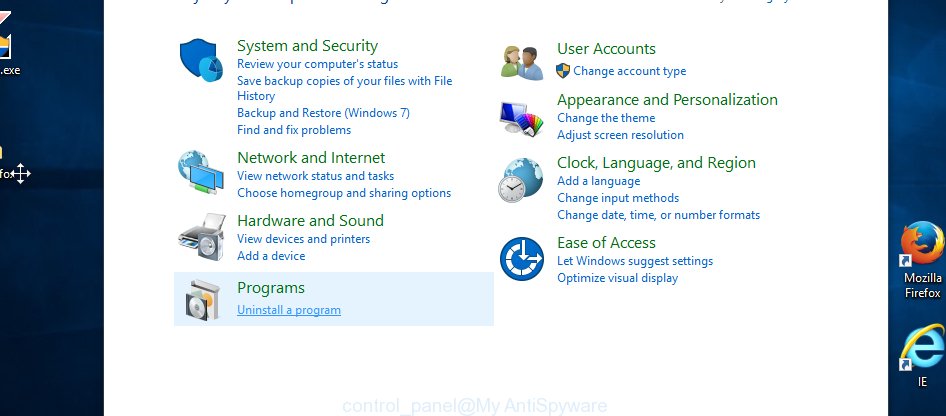
Windows 7, Vista, XP
Open Start menu and choose the ‘Control Panel’ at right as displayed on the screen below.
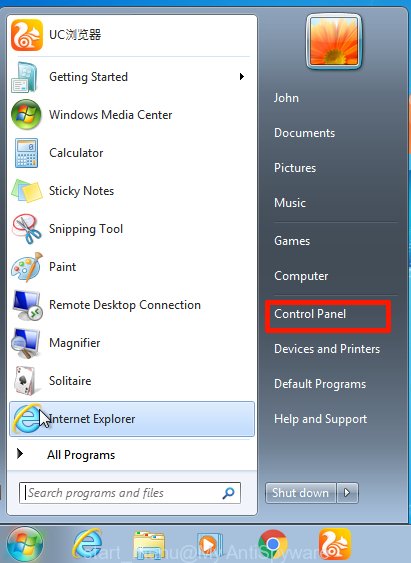
Then go to ‘Add/Remove Programs’ or ‘Uninstall a program’ ({Windows} 7 or Vista) as displayed on the image below.
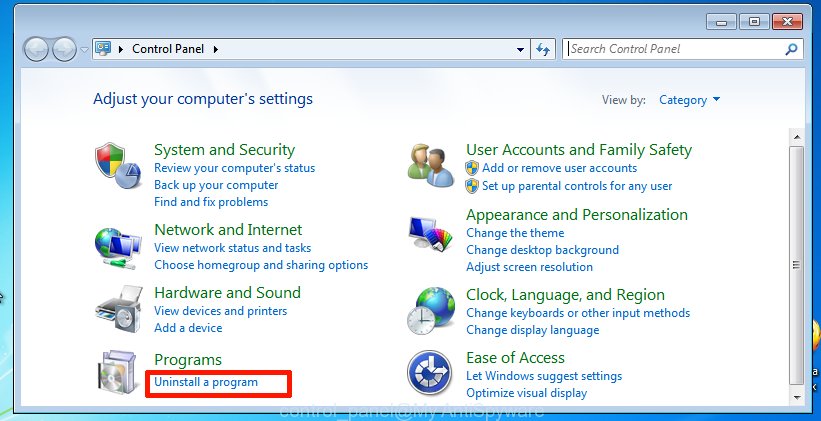
Carefully browse through the list of installed programs and delete all apps that has the name like “”Your Browsing History Might Be Public””. We recommend to press ‘Installed programs’ and even sorts all installed apps by date. After you have found anything dubious that may be the adware, ad supported software or PUPs, then choose this program and click ‘Uninstall’ in the upper part of the window. If the suspicious program blocked from removal, then run Revo Uninstaller Freeware to fully delete it from your PC system.
Remove “Your Browsing History Might Be Public” pop ups from Chrome
Reset Google Chrome settings is a easy way to remove the browser hijackers, malicious and ‘ad-supported’ extensions, as well as to recover the internet browser’s newtab page, homepage and search provider by default that have been replaced by adware responsible for redirecting your internet browser to “Your Browsing History Might Be Public” site.

- First launch the Chrome and press Menu button (small button in the form of three dots).
- It will display the Chrome main menu. Select More Tools, then click Extensions.
- You will see the list of installed extensions. If the list has the addon labeled with “Installed by enterprise policy” or “Installed by your administrator”, then complete the following guide: Remove Chrome extensions installed by enterprise policy.
- Now open the Chrome menu once again, click the “Settings” menu.
- You will see the Google Chrome’s settings page. Scroll down and click “Advanced” link.
- Scroll down again and press the “Reset” button.
- The Google Chrome will show the reset profile settings page as shown on the screen above.
- Next click the “Reset” button.
- Once this task is finished, your web-browser’s newtab, start page and search engine by default will be restored to their original defaults.
- To learn more, read the blog post How to reset Google Chrome settings to default.
Remove “Your Browsing History Might Be Public” from Firefox by resetting browser settings
If the Firefox settings like new tab, homepage and search provider by default have been replaced by the ad-supported software, then resetting it to the default state can help.
First, open the Mozilla Firefox. Next, click the button in the form of three horizontal stripes (![]() ). It will display the drop-down menu. Next, click the Help button (
). It will display the drop-down menu. Next, click the Help button (![]() ).
).

In the Help menu click the “Troubleshooting Information”. In the upper-right corner of the “Troubleshooting Information” page press on “Refresh Firefox” button as on the image below.

Confirm your action, click the “Refresh Firefox”.
Remove “Your Browsing History Might Be Public” pop-ups from IE
The Internet Explorer reset is great if your web-browser is hijacked or you have unwanted addo-ons or toolbars on your web browser, which installed by an malware.
First, open the Microsoft Internet Explorer, press ![]() ) button. Next, click “Internet Options” as shown on the screen below.
) button. Next, click “Internet Options” as shown on the screen below.

In the “Internet Options” screen select the Advanced tab. Next, press Reset button. The Internet Explorer will show the Reset Internet Explorer settings prompt. Select the “Delete personal settings” check box and press Reset button.

You will now need to reboot your computer for the changes to take effect. It will delete ad-supported software which causes unwanted “Your Browsing History Might Be Public” popup ads, disable malicious and ad-supported web browser’s extensions and restore the Internet Explorer’s settings such as start page, new tab and search engine by default to default state.
Fix infected web browsers shortcuts to delete “Your Browsing History Might Be Public” redirect
Important to know, most anti malware applications which are able to get rid of ad supported software which causes undesired “Your Browsing History Might Be Public” pop ups, but unable to detect and recover changed shortcuts. So, you need to fix the desktop shortcuts for your Chrome, Internet Explorer, Firefox and MS Edge web browsers manually.
To clear the internet browser shortcut, right-click to it and choose Properties. On the Shortcut tab, locate the Target field. Click inside, you will see a vertical line – arrow pointer, move it (using -> arrow key on your keyboard) to the right as possible. You will see a text such as “http://site.address” that has been added here. You need to delete it.

When the text is removed, press the OK button. You need to clean all shortcuts of all your web browsers, as they may be affected too.
Get rid of unwanted Scheduled Tasks
If the intrusive “Your Browsing History Might Be Public” page opens automatically on Windows startup or at equal time intervals, then you need to check the Task Scheduler Library and remove all the tasks which have been created by malicious programs.
Press Windows and R keys on the keyboard together. This shows a prompt that titled as Run. In the text field, type “taskschd.msc” (without the quotes) and press OK. Task Scheduler window opens. In the left-hand side, click “Task Scheduler Library”, as shown below.
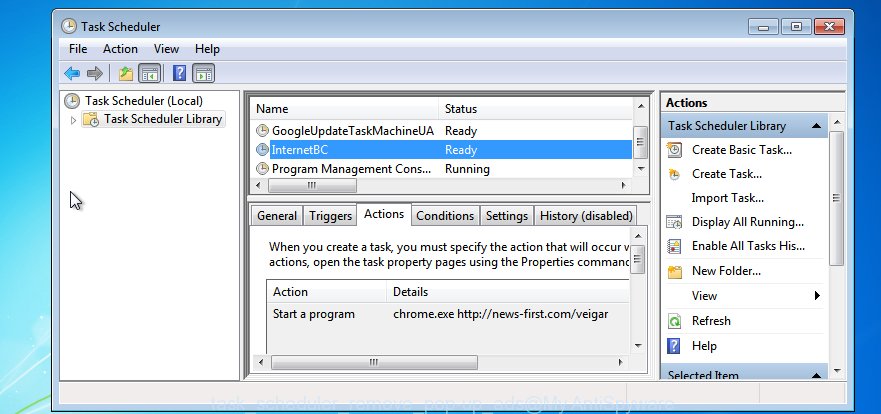
Task scheduler
In the middle part you will see a list of installed tasks. Please select the first task, its properties will be display just below automatically. Next, click the Actions tab. Pay attention to that it launches on your machine. Found something like “explorer.exe http://site.address” or “chrome.exe http://site.address”, then delete this harmful task. If you are not sure that executes the task, check it through a search engine. If it is a component of the adware, then this task also should be removed.
Having defined the task that you want to remove, then click on it with the right mouse button and choose Delete as shown below.

Delete a task
Repeat this step, if you have found a few tasks which have been created by malicious applications. Once is done, close the Task Scheduler window.
Use free malware removal tools to completely delete “Your Browsing History Might Be Public” pop up advertisements
After completing the manual removal steps above all unwanted software, malicious web browser’s extensions and ad-supported software that causes lots of intrusive “Your Browsing History Might Be Public” ads should be removed. If the problem with “Your Browsing History Might Be Public” advertisements is still remained, then we recommend to scan your personal computer for any remaining malicious components. Use recommended free adware removal applications below.
How to get rid of “Your Browsing History Might Be Public” pop-up advertisements with Zemana Anti-malware
Zemana Anti-malware is a tool that can remove ad-supported software, potentially unwanted apps, hijacker infections and other malicious software from your machine easily and for free. Zemana Anti-malware is compatible with most antivirus software. It works under Windows (10 – XP, 32 and 64 bit) and uses minimum of computer resources.
Click the following link to download Zemana Free. Save it on your Windows desktop or in any other place.
164721 downloads
Author: Zemana Ltd
Category: Security tools
Update: July 16, 2019
After downloading is complete, launch it and follow the prompts. Once installed, the Zemana will try to update itself and when this task is done, click the “Scan” button .Zemana AntiMalware program will scan through the whole computer for the ‘ad supported’ software related to “Your Browsing History Might Be Public” popup ads.
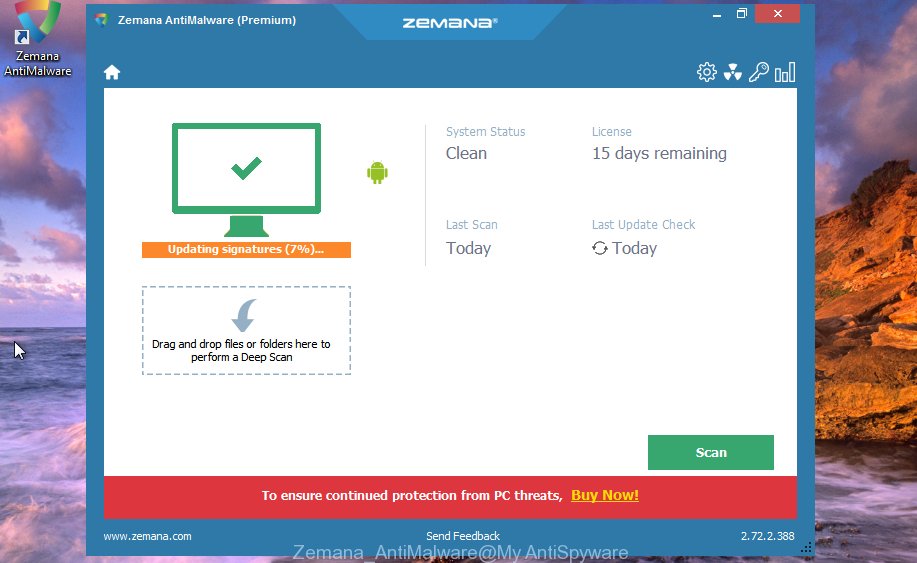
This process can take some time, so please be patient. During the scan Zemana Anti Malware will search for threats exist on your PC system. Review the report and then click “Next” button.
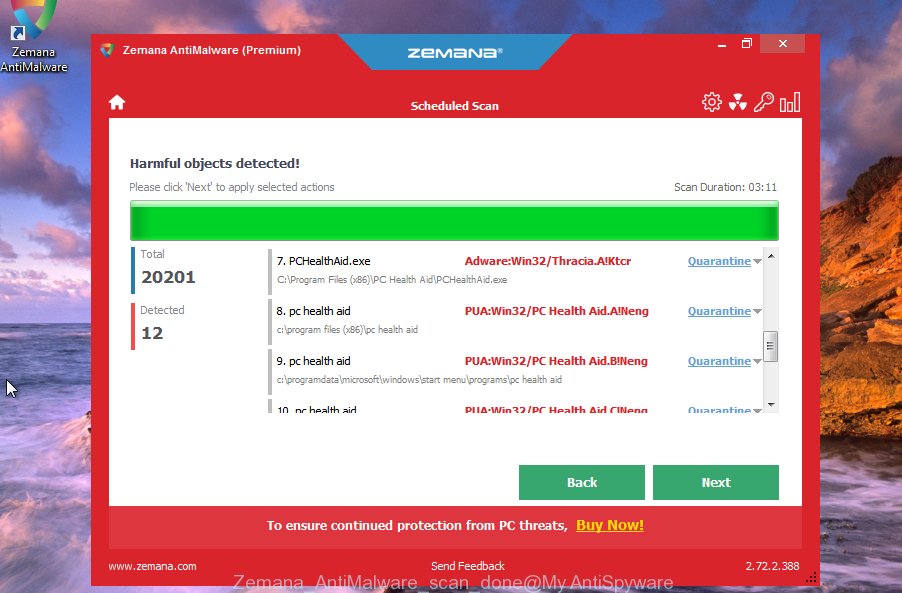
The Zemana Anti-Malware will remove adware that cause undesired “Your Browsing History Might Be Public” pop ups to appear and move items to the program’s quarantine.
Automatically remove “Your Browsing History Might Be Public” pop up advertisements with Malwarebytes
We recommend using the Malwarebytes Free. You can download and install Malwarebytes to find out adware and thereby remove “Your Browsing History Might Be Public” pop up advertisements from your internet browsers. When installed and updated, the free malicious software remover will automatically check and detect all threats present on the machine.
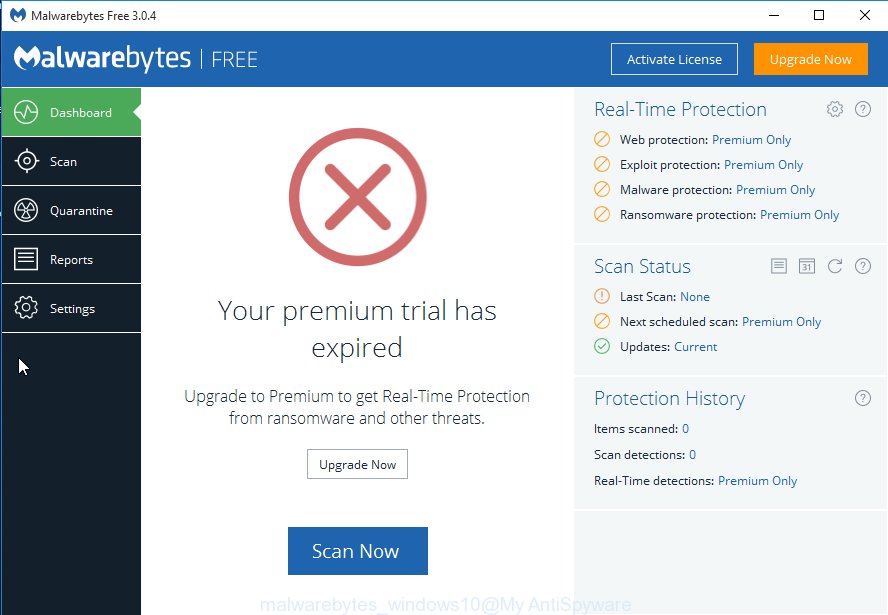
- Visit the following page to download MalwareBytes Free. Save it on your Desktop.
Malwarebytes Anti-malware
326997 downloads
Author: Malwarebytes
Category: Security tools
Update: April 15, 2020
- At the download page, click on the Download button. Your web browser will show the “Save as” prompt. Please save it onto your Windows desktop.
- When the downloading process is finished, please close all apps and open windows on your personal computer. Double-click on the icon that’s named mb3-setup.
- This will open the “Setup wizard” of MalwareBytes onto your system. Follow the prompts and do not make any changes to default settings.
- When the Setup wizard has finished installing, the MalwareBytes Anti Malware (MBAM) will start and show the main window.
- Further, click the “Scan Now” button for checking your computer for the ad-supported software which redirects your browser to intrusive “Your Browsing History Might Be Public” site. This process can take some time, so please be patient. While the MalwareBytes utility is checking, you can see how many objects it has identified as being affected by malicious software.
- Once MalwareBytes Anti-Malware completes the scan, MalwareBytes will open a scan report.
- Make sure all threats have ‘checkmark’ and click the “Quarantine Selected” button. After the procedure is finished, you may be prompted to reboot the personal computer.
- Close the Anti Malware and continue with the next step.
Video instruction, which reveals in detail the steps above.
Double-check for potentially unwanted apps with AdwCleaner
AdwCleaner will help get rid of ad supported software responsible for “Your Browsing History Might Be Public” redirect that slow down your system. The browser hijackers, ad supported software and other potentially unwanted software slow your web-browser down and try to force you into clicking on misleading advertisements and links. AdwCleaner removes the ad-supported software and lets you enjoy your computer without “Your Browsing History Might Be Public” pop up ads.
Click the following link to download AdwCleaner. Save it on your Desktop.
225508 downloads
Version: 8.4.1
Author: Xplode, MalwareBytes
Category: Security tools
Update: October 5, 2024
When the download is done, open the folder in which you saved it. You will see an icon like below.
![]()
Double click the AdwCleaner desktop icon. When the tool is launched, you will see a screen as displayed on the screen below.
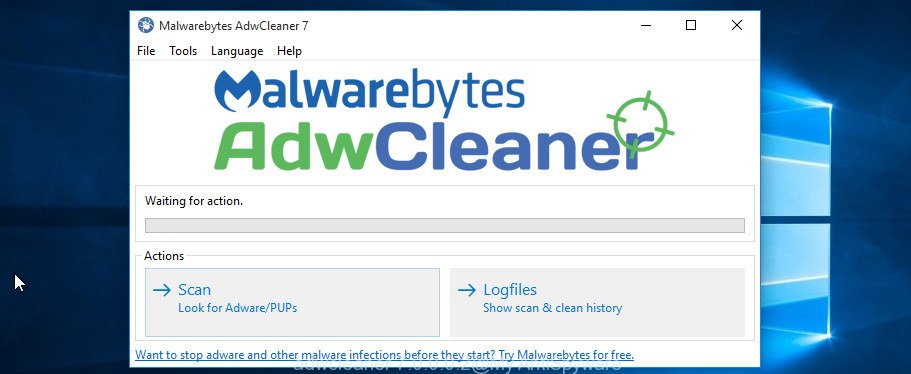
Further, click “Scan” button to detect ad-supported software related to “Your Browsing History Might Be Public” pop-up advertisements. This task can take quite a while, so please be patient. After AdwCleaner has completed scanning your machine, AdwCleaner will display you the results as displayed in the following example.
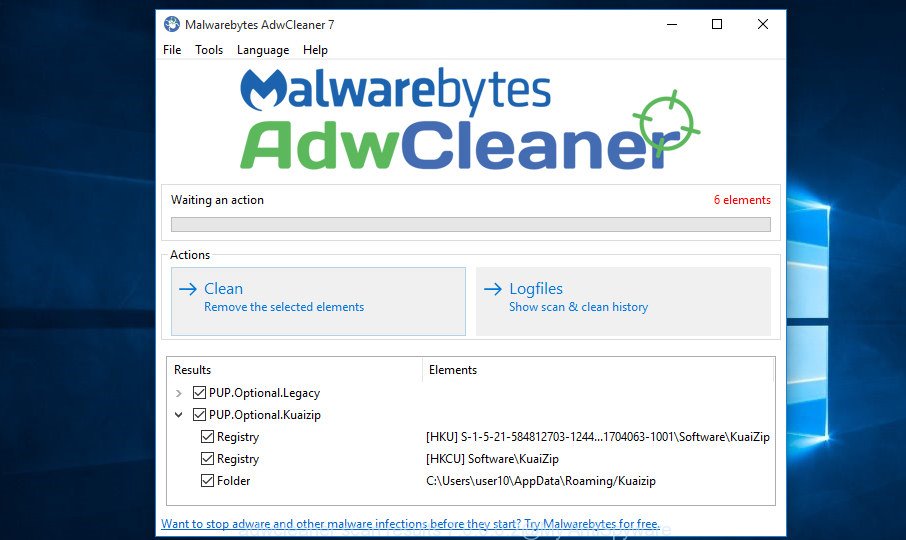
You may move threats to Quarantine (all selected by default) by simply click “Clean” button. It will open a prompt as displayed on the image below.
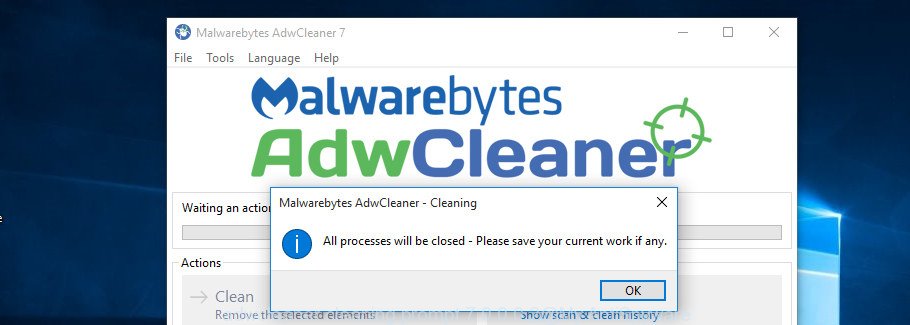
You need to click “OK”. After the process is finished, the AdwCleaner may ask you to restart your computer. When your system is started, you will see an AdwCleaner log.
These steps are shown in detail in the following video guide.
How to block “Your Browsing History Might Be Public” redirect
Enabling an ad-blocking program such as AdGuard is an effective way to alleviate the risks. Additionally, ad blocker apps will also protect you from malicious advertisements and web sites, and, of course, block redirection chain to “Your Browsing History Might Be Public” and similar sites.
Installing the AdGuard ad blocker program is simple. First you will need to download AdGuard from the following link. Save it on your MS Windows desktop.
26824 downloads
Version: 6.4
Author: © Adguard
Category: Security tools
Update: November 15, 2018
After downloading is done, double-click the downloaded file to launch it. The “Setup Wizard” window will show up on the computer screen as displayed on the screen below.
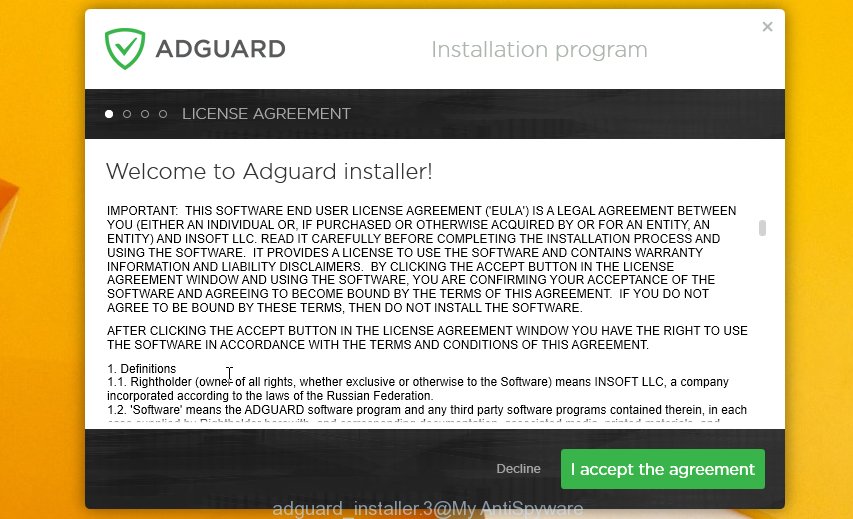
Follow the prompts. AdGuard will then be installed and an icon will be placed on your desktop. A window will show up asking you to confirm that you want to see a quick guidance as on the image below.

Press “Skip” button to close the window and use the default settings, or press “Get Started” to see an quick instructions that will help you get to know AdGuard better.
Each time, when you run your personal computer, AdGuard will start automatically and block ads, web pages such “Your Browsing History Might Be Public”, as well as other harmful or misleading web-sites. For an overview of all the features of the application, or to change its settings you can simply double-click on the AdGuard icon, which is located on your desktop.
How to prevent “Your Browsing History Might Be Public” pop-up advertisements from getting inside your computer
The adware usually spreads bundled with another program in the same installation package. The risk of this is especially high for the various free programs downloaded from the Web. The creators of the programs are hoping that users will run the quick setup option, that is simply to click the Next button, without paying attention to the information on the screen and don’t carefully considering every step of the install procedure. Thus, the adware can infiltrate your computer without your knowledge. Therefore, it is very important to read all the information that tells the application during install, including the ‘Terms of Use’ and ‘Software license’. Use only the Manual, Custom or Advanced installation option. This mode will allow you to disable all optional and unwanted software and components.
Finish words
Now your PC should be clean of the ad supported software that causes web-browsers to display annoying “Your Browsing History Might Be Public” popups. Remove AdwCleaner. We suggest that you keep Zemana (to periodically scan your PC for new adwares and other malware) and AdGuard (to help you block annoying popup ads and harmful web sites). Moreover, to prevent adwares, please stay clear of unknown and third party applications, make sure that your antivirus program, turn on the option to find PUPs (potentially unwanted programs).
If you need more help with “Your Browsing History Might Be Public” pop-up ads related issues, go to our Spyware/Malware removal forum.

